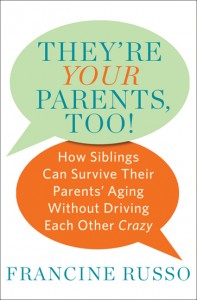 I was recently invited to review They’re Your Parents, Too!: How Siblings Can Survive Their Parents’ Aging Without Driving Each Other Crazy
I was recently invited to review They’re Your Parents, Too!: How Siblings Can Survive Their Parents’ Aging Without Driving Each Other Crazy
by former Time magazine boomer beat reporter Francine Russo.
Color me CRAZY!
I’ve traveled down this road, and reading Francine’s book brought back some all too familiar scenarios from one of the darkest chapters of my life following the death of my mother, and my fathers subsequent decline into dementia.
My own family dynamics were riddled with anger, past resentments, criticism and guilt. I had not experienced a good relationship with my brothers for the 20 years prior to my mothers death, and shared little to no contact with them. I was the child who was “far away” and subsequently faced 4 brothers who refused to share information (with regard to my father) about health, finances, or indeed anything.
Francine’s book greatly helped me to make sense of the psychological dynamics, demands and consequences .
This was a time that exposed past untold stories and a range of very difficult emotions for me. Much of what occurred in my own family was inevitable.
My relationship with my siblings was not worth mending, and I have been able to accept this and move on.
Will you and your siblings be able to reach an understanding and work together, or will the challenges you face tear you apart? They’re Your Parents Too is an indispensable guide for anyone whose parents are aging. No matter how well prepared one thinks they are – anticipated and unanticipated struggles in caring for aging parents do seem to take a toll on sibling relationships
Francine Russo’s book is filled with expert guidance from gerontologists, family, therapists, elder-care-attorneys, financial planners and health workers. She recounts engaging, helpful stories of sisters and brothers who struggled to find their way through this family challenge as their parents age.
This is a must have book/manual for anyone who is a caregiver for someone who is aging, professionals who are working with families of the elderly and anyone who wants to repair their relationships with their siblings— I highly recommend it. 😀 – Kathy



